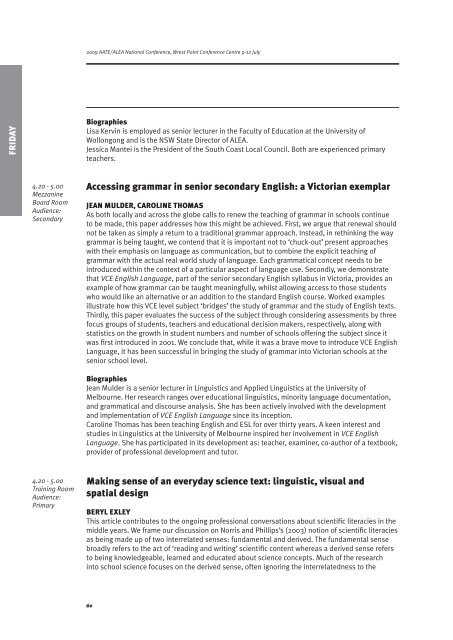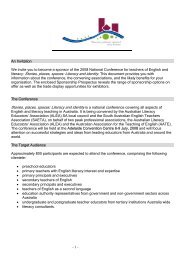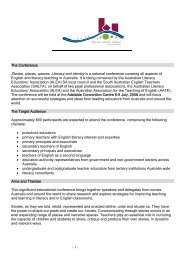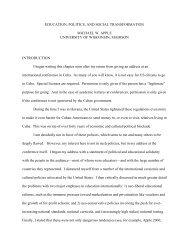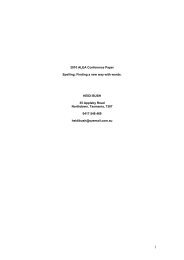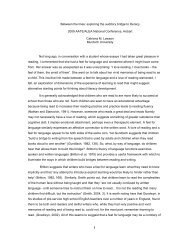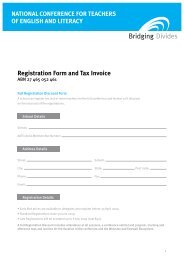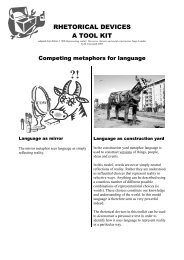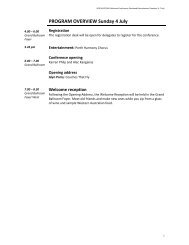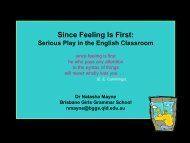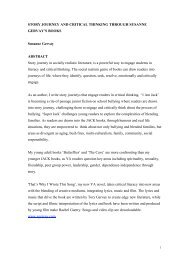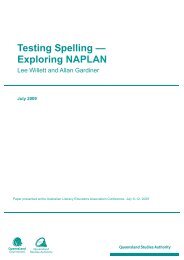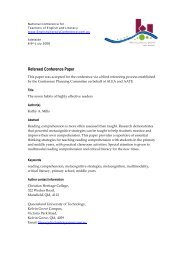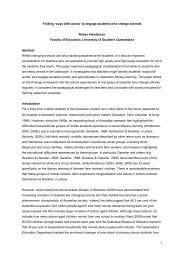Download - AATE/ALEA National conference
Download - AATE/ALEA National conference
Download - AATE/ALEA National conference
You also want an ePaper? Increase the reach of your titles
YUMPU automatically turns print PDFs into web optimized ePapers that Google loves.
2009 <strong>AATE</strong>/ <strong>ALEA</strong> <strong>National</strong> Conference, Wrest Point Conference Centre 9-12 July<br />
FRIDAY<br />
Biographies<br />
Lisa Kervin is employed as senior lecturer in the Faculty of Education at the University of<br />
Wollongong and is the NSW State Director of <strong>ALEA</strong>.<br />
Jessica Mantei is the President of the South Coast Local Council. Both are experienced primary<br />
teachers.<br />
4.20 - 5.00<br />
Mezzanine<br />
Board Room<br />
Audience:<br />
Secondary<br />
Accessing grammar in senior secondary English: a Victorian exemplar<br />
JEAN MULDER, CAROLINE THOMAS<br />
As both locally and across the globe calls to renew the teaching of grammar in schools continue<br />
to be made, this paper addresses how this might be achieved. First, we argue that renewal should<br />
not be taken as simply a return to a traditional grammar approach. Instead, in rethinking the way<br />
grammar is being taught, we contend that it is important not to ‘chuck-out’ present approaches<br />
with their emphasis on language as communication, but to combine the explicit teaching of<br />
grammar with the actual real world study of language. Each grammatical concept needs to be<br />
introduced within the context of a particular aspect of language use. Secondly, we demonstrate<br />
that VCE English Language, part of the senior secondary English syllabus in Victoria, provides an<br />
example of how grammar can be taught meaningfully, whilst allowing access to those students<br />
who would like an alternative or an addition to the standard English course. Worked examples<br />
illustrate how this VCE level subject ‘bridges’ the study of grammar and the study of English texts.<br />
Thirdly, this paper evaluates the success of the subject through considering assessments by three<br />
focus groups of students, teachers and educational decision makers, respectively, along with<br />
statistics on the growth in student numbers and number of schools offering the subject since it<br />
was first introduced in 2001. We conclude that, while it was a brave move to introduce VCE English<br />
Language, it has been successful in bringing the study of grammar into Victorian schools at the<br />
senior school level.<br />
Biographies<br />
Jean Mulder is a senior lecturer in Linguistics and Applied Linguistics at the University of<br />
Melbourne. Her research ranges over educational linguistics, minority language documentation,<br />
and grammatical and discourse analysis. She has been actively involved with the development<br />
and implementation of VCE English Language since its inception.<br />
Caroline Thomas has been teaching English and ESL for over thirty years. A keen interest and<br />
studies in Linguistics at the University of Melbourne inspired her involvement in VCE English<br />
Language. She has participated in its development as: teacher, examiner, co-author of a textbook,<br />
provider of professional development and tutor.<br />
4.20 - 5.00<br />
Training Room<br />
Audience:<br />
Primary<br />
Making sense of an everyday science text: linguistic, visual and<br />
spatial design<br />
BERYL EXLEY<br />
This article contributes to the ongoing professional conversations about scientific literacies in the<br />
middle years. We frame our discussion on Norris and Phillips’s (2003) notion of scientific literacies<br />
as being made up of two interrelated senses: fundamental and derived. The fundamental sense<br />
broadly refers to the act of ‘reading and writing’ scientific content whereas a derived sense refers<br />
to being knowledgeable, learned and educated about science concepts. Much of the research<br />
into school science focuses on the derived sense, often ignoring the interrelatedness to the<br />
60


